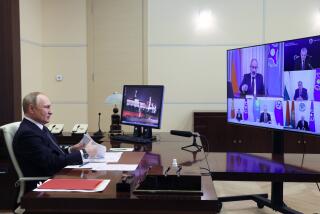Soviets, Japan Set Date for Gorbachev’s Visit : Diplomacy: The Kremlin leader’s historic trip is scheduled for April. No progress is made on the fate of disputed islands.
- Share via
MOSCOW — The Soviet Union and Japan agreed Wednesday on tentative dates for President Mikhail S. Gorbachev’s historic visit to Japan but failed to come any closer to resolving the key issue that still divides them--the fate of four small islands off Japan’s northernmost main island of Hokkaido.
“We still haven’t found a common language, a common picture,” a Japanese government official said after two hours of talks between Gorbachev and Japanese Foreign Minister Taro Nakayama, who was ending a three-day official visit to Moscow.
Japan has refused to upgrade its relations with Moscow or to sign a peace treaty with its former wartime foe until the four islands seized by the Red Army in the final days of World War II are returned. The dispute over what Japan calls the “Northern Territories” has dominated Soviet-Japanese relations for decades.
According to the Japanese official, who spoke on condition that he not be identified further, Gorbachev proposed during his meeting with Nakayama that he visit Japan April 16-19. The dates, the Japanese official said, will be confirmed through diplomatic channels later.
Gorbachev’s trip will be the first to Japan by any leader of the Soviet Union. Moreover, Japan has been the biggest of the industrial democracies to spurn blandishments from Gorbachev to improve ties across the board, insisting that the territorial issue be resolved first.
Since Gorbachev became Soviet leader in 1985, the Soviets have shown their willingness to listen to the Japanese position but object to making an improvement in relations hostage to a change in the status of the islands at the southern end of the Kuril chain. By considering a “balance of interests,” Gorbachev told Nakayama, a solution to the territorial dispute can be found, according to Tass, the official Soviet news agency.
Gorbachev’s trip to Japan is likely to spark intense speculation that an agreement in the rancorous dispute is near. Perhaps to defuse such speculation, Tass also published remarks from the Soviet foreign ministry’s leading Asia specialist cautioning that the process will be long.
“The issue cannot be resolved during one visit, as the issue is quite delicate,” Deputy Foreign Minister Igor A. Rogachev observed. “It will take time to thoroughly and comprehensively study and discuss all aspects of the problem. President Gorbachev’s visit to Japan is expected to be followed by a return visit by the Japanese prime minister. We believe that it will take several such visits to settle the issue.”
The Japanese reject that gradual approach. “We have now come to the area where we need a leap, a jump,” the Japanese government official said. “We consider this territorial issue to be a remainder of Stalinist expansionist policy.”
Nakayama, who earlier had five hours of talks with Soviet Foreign Minister Alexander A. Bessmertnykh, was the first high official from the Western camp to visit Moscow since the Soviet crackdowns in Lithuania and Latvia and reportedly expressed his “deep concern.”
In line with the more assertive diplomacy now being pursued by Tokyo in the field of human rights, Nakayama said that the crackdown operations that have caused 20 deaths are at odds with the Kremlin’s professed goals of social and political reform, the Japanese official said.
In December, Japan announced its first official aid to the Soviet Union--$100 million in loans as emergency aid. Japanese foreign ministry spokesman Taizo Watanabe has said that the assistance would be halted if Moscow strayed permanently from the path of reform.
“As of this moment, we have not made any particular decision yet,” the Japanese official said Wednesday night after Nakayama’s talks with Gorbachev. “But we are observing the situation very closely.”
Members of the Japanese foreign minister’s entourage said that Gorbachev’s visit had originally been planned for this January but that, at the request of the Kremlin, it was put off until April because of the worsening domestic situation in the Soviet Union.
More to Read
Sign up for Essential California
The most important California stories and recommendations in your inbox every morning.
You may occasionally receive promotional content from the Los Angeles Times.













